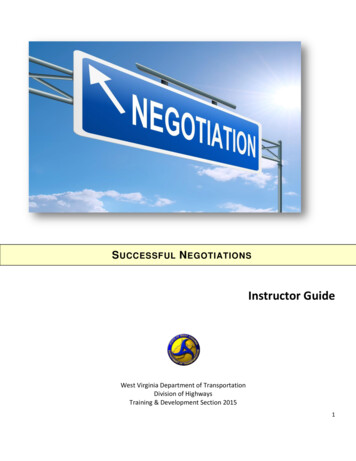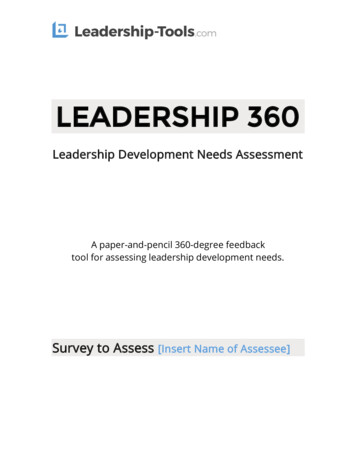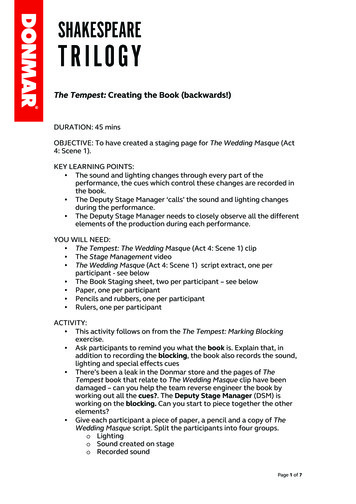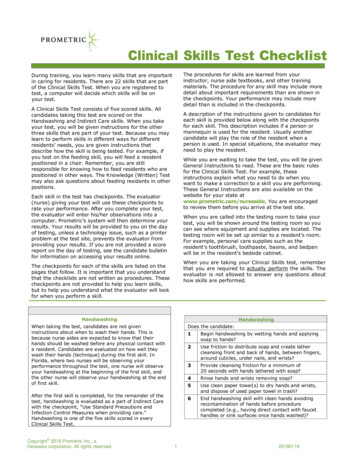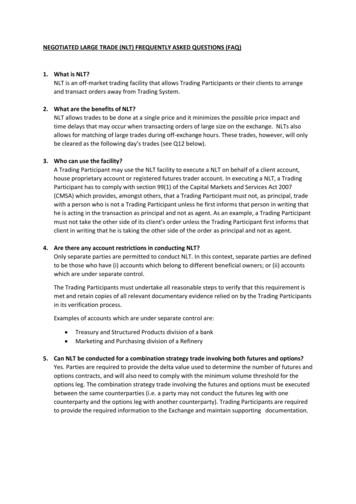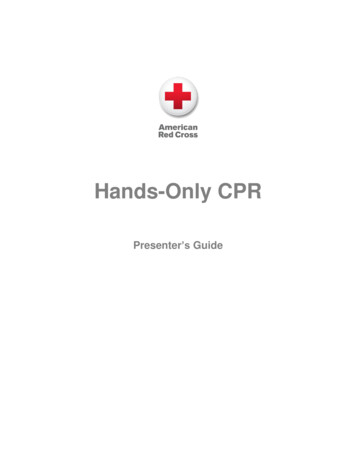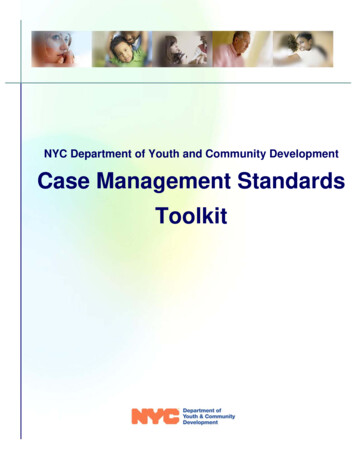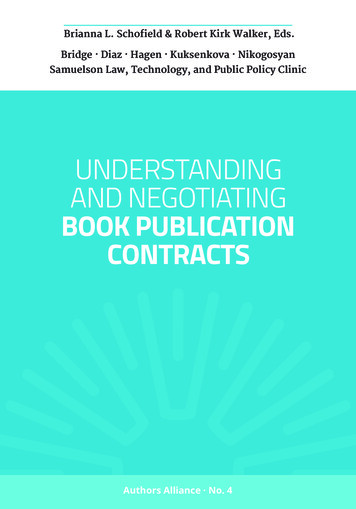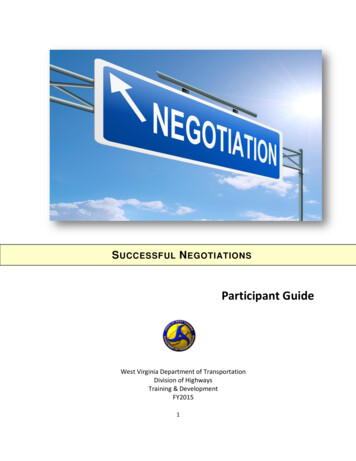
Transcription
S UCCESSFUL N EGOTIATIONSParticipant GuideWest Virginia Department of TransportationDivision of HighwaysTraining & DevelopmentFY20151
Workshop ObjectivesBy the end of this workshop you will be able to: Identify your negotiation style Identify the three phases of negotiation Identify the key skills for negotiation Establish your best alternative to a negotiated agreement Identify your zone of possible agreement Recognize your latitudes of acceptance and rejection Identify your walk-away price Create a negotiation framework Provide common negotiation outcomes2
The first step to getting the things you wantout of life is this: Decide what you want.Ben SteinIntroductionAlthough we usually think of boardrooms, lawsuits, and million-dollar deals when we hear the word“negotiation,” the truth is that we negotiate all of the time. Did you ever decide where to eat dinner withyour friends? Have you ever decided on chore assignments with your family? Did you ever ask yourboss for a raise? These are all situations which involve negotiating. In this workshop, you will learn thephases of negotiation, tools to use during negotiation, ways to build win-win situations for all involved,and how to use a process to negotiate more effectively.3
NEGOTIATING STYLESELF-ASSESSMENTThe purpose of this self-assessment is to help you examine yourpersonal negotiating style.Negotiation – a process by which two parties communicate with eachother in order to reach an outcome on which they mutually agree.Directions1. Answer all questions to the best of your ability. There are no right or wrong answers. Don’t try tothink of the “correct” or most “desirable” response, but simply respond with your honest reactions.2. Respond by putting a check-mark or X in one column per question or statement.How likely are you to do each of the followingwhen NEGOTIATING?1.I’ll come up with a plan so that I can steer thenegotiation to go my way.2.I’ll do things expressly to make sure that thenegotiation stays friendly and comfortable.3.I’ll go out of my way to make sure that theoutcome for the other person is fair.4.I’ll do things so that both of us can get what wewant from the negotiation.5.If something needs to be negotiated, I’llimmediately step forward to do it.6.I’ll give some in order to get some from the personI’m negotiating with.7.If the negotiation is not going my way, I’ll bail outof the negotiation.8.I’ll suggest creative solutions that allow both of usto get what we want from the negotiation.9.If it seems important for the other person to comeout on top, I’ll give in to them.VeryUnlikelyUnlikelyNeitherLikely norUnlikelyVeryUnlikelyUnlikelyNeitherLikely norLikelyVeryLikely10. I’ll avoid difficult issues to keep the negotiationfrom getting nasty.11. If the other person compromises their position, I’llcompromise my position in return.How likely are you to do each of the following4LikelyVeryLikely
Unlikelywhen NEGOTIATING?12. I’ll make sure that both of our needs areunderstood so that both of us can come out ontop.13. I’ll present information when negotiating, even if itdoesn’t necessarily always support my position.14. I’ll propose a place in the middle where we bothcan meet.15. I’ll try to see things from the other person’sviewpoint and be considerate of their needs.StronglyAgree16. In every negotiation, both sides have to givesomething up to get something in return.17. What’s good for me is really all that matters whennegotiating.18. I’ll do almost anything to keep from having toengage in negotiation.19. In negotiating, someone wins and someone has tolose.20. The feelings of the other person that I’mnegotiating with are important to me.21. Negotiation works better when the focus is oncommon agreement rather than differences.22. I can be aggressive when it comes to getting myway from a negotiation.23. When you compromise in a negotiation, you reallyjust lose.24. If the other person gets a “raw deal” from ournegotiation, that really doesn’t matter to me.25. Keeping the comfort level high is very important tome when I’m negotiating.5AgreeNeitherAgree orDisagreeDisagreeStronglyDisagree
Negotiation Skills Case StudyMike’s Story:Mike is the assistant director at a large non-profit agency that provides contract services to astate government agency throughout the state. One of the office directors he supervises hassuddenly resigned. In order to reassign the director’s work, he decides to delegate to the oneemployee who works locally in headquarters some of the duties of the resigning manager.Deanne’s Story:Deanne is the local employee to whom Mike has decided to add temporary job duties to ensurethat the critical functions of the office section are accomplished. Her boss Penny, the trainingdirector of the organization, has just called her personally to tell her that she is resigning herposition effectively immediately and briefs her on what will likely be expected of her form highermanagement .What Happens?By the end of the day, Mike calls Deanne and asks her to come up to his office. He tells Deannethat Penny has resigned her position as Training Director and that she will not be coming backto work. Mike then explains to Deanne that she will have to pick up a percentage of Penny’sduties until they are able to hire a new director. Deanne asks him what percentage of Penny’swork Mike estimates that she will have to perform. Mike says that it will be about 1/3 of Penny’sduties and that, of course, she will still have to complete all of her current job duties, also. Miketells her that he will have a list of those duties to her by the next morning and asks her to comeby his office at 10am the next morning to obtain that list.Questions for Review:What needs to be compromised in this situation?Who has the strongest position in the negotiations?What suggestions do you have for Mike as the manager?What should Deanne do before she tries to negotiate with Mike?BACK TO SCENARIOThe next morning, Deanne asks Mike if the organization would be willing to pay her anadditional temporary salary during the time of this assignment, since she is also expected tocomplete all of her current job duties, also. Mike says that would be fine and proceeds tocalculate how much that would be. He tells Deanne what that the amount would be per month.Deanne knows that this period of time is very stressful for upper management, as the upcomingyear’s budget is under development and is due to be presented to the Board of Directors inthree weeks, therefore she is now prepared to add another item to the negotiation. She asksMike if he would additionally forgive her the final seven payments on an interest-free loan thatthe organization had provided to employees for the purpose of purchasing their own personalcomputers. Later that afternoon Mike calls Deanne and tells her that he has agreed to herrequest. Deanne asks him if they should make that agreement in writing so that they bothunderstand what they are getting. Mike agrees.6
Negotiation SkillsSkills for SuccessfulNegotiatingEstablishing Your WATNA andBATNAThese are some ofthe skills neededfor successfulnegotiating. Ifparticipants do notmention any ofthese, add them tothe list yourself.In most negotiations,the parties areinfluenced by theirassumptions aboutwhat they think are thealternatives to a negotiated agreement. Often theparties have an unrealistic idea of what thesealternatives are, and they are unwilling to makeconcessions because they think they can do just aswell without negotiating. If you do not have a clearidea of your WATNA (Worst Alternative to aNegotiated Agreement) and BATNA (BestAlternative to a Negotiated Agreement), you willnegotiate poorly based on false notions about whatyou can expect without an agreement.Effective speakingEffective listeningA sense of humorA positive attitudeRespectSelf-confidenceEmotional intelligencePersistencePatienceCreativityPersonal PreparationOne way to relieve some of the tension you may be feeling before a negotiation isto remind yourself that there is nothing to be afraid of. As long as you understandyour position, there is no danger that you will “lose” the negotiation. During andbefore negotiation you should always be:Polite - It never reduces your argumentFirm - Removes Perceptions of WeaknessCalm - Facilitates Persuasion and CompromiseDo not take things personallyKnowing your position before entering negotiations means that you are sure of your “red lines”.Things that you are not prepared to consider that would make your position worse than it is now.Many people get pushed into a deal which is unsatisfactory to them because they have failed toprepare for the negotiation in this way. If you go into negotiations with vague ideas, that vaguenesswill become a weakness in your negotiating position.7
Steps to Creating a Win-Win Outcome1) Determine what you need and want. As you prepare for negotiating, take time toassess what is it that you or your company wants to happen and keep this as thefocal point of our negotiation. Many times, you may lose sight of this andoverlook a crucial point during negotiations.2) Learn more about the other party in negotiation. Find out what motivates themand what they would consider a success in their world. Work towards meetingtheir needs. You should not work towards a take-all situation.3) Structure the negotiation talks. Create an agenda and avoid getting into off-topicdiscussions. If other topics come up, suggest bringing them up in anothermeeting. If you are negotiating with internal employees, sit on the same side ofthe table and try to remain close to them. This will reduce the competitivetendencies usually found when sitting across from each other.4) Once you create your plan, do not change it, or give points away. Set a specifictime to complete the negotiations. If you do not reach an agreement, then calltime and meet at another time. Avoid extending the talks, because being tiredleads to poor decisions.8
Negotiation TipsNegotiation tips and techniques come in handy, in any kind of social interaction or business dealing.Reading through some of the tips I offer here, might cure your ineptitude at handling various deals in life.Most of the skills that can actually help you in life are not taught at school. One of them is the art ofnegotiation. Most people learn it through experience and by watching good negotiators, few are initiatedinto the art by good mentors and some are just natural negotiators. Experts have a keen understanding ofwhat the person in front of them wants and have a talent to perceive their weaknesses. Theseweaknesses are exploited through various negotiation techniques.Tips and TechniquesThese are principles of negotiation, which can be used in any kind of a deal settlement. It might be abuying/selling deal, a child-parent argument, or even a salary negotiation with your boss.A negotiation is a tug-of-war fight to get an upper hand. There are various factors which can help you getinto a better bargaining position.Make Them An Offer They Can't RefuseBefore going through with a negotiation, think through it, decide what you want, and then try to get asmuch information you can, about the opposing party's expectations and their bargaining position. Beconfident during negotiations. Do not show hesitation. Have a calm and cool air about you. This will giveyou an idea about how much you can make them bend and how much you are willing to bend.Make a straightforward win/win offer. State exactly what you want and what is in it for them. Then, heartheir side completely. Be reasonable and argue your case and its advantages for them. Exploit theloopholes in their arguments. Talk in a style which emphasizes what they can get out of this. Chances arethat they will see reason. Of course, a lot depends on how desperately they need the deal to close.Never, Ever Show Your DesperationWhatever be the nature of the deal, never show how desperate you are to get this deal closed. That islike putting your cards down and letting other people know that you have no aces left. That will be the endof your bargaining position.Be it buying, selling or any other type of bargaining, act as if the deal in front of you is just one of themany options you have and cloak your desperation. Do not get carried away in your bluffing. Especially,in salary negotiation, do not be the first to quote a number to your prospective employer and if you mustquote, let it be higher than your requirement. Even in real estate negotiations, do not show yourdesperation in buying or selling the property.Use Leverage Offered By Your PositionIn certain deals, you have an inherent advantage over the opposing party, in terms of resources,knowledge, and power position. In simple words, if you have the knowledge that they need to get the dealclosed more desperately than you do, then use it to your advantage. Use the leverage you get from yourhigher power position, to get a benefit out of the deal.9
Gauge Weaknesses/Desperation and ExploitA negotiation is a mind game between two or more parties, who keep on sparring till they understandeach other's weaknesses. So keep sparring and try to sift the bluff of the opposing party from the truth.The moment you spot it, you are in a superior bargaining position as you know exactly what is the key.You must exploit the slightest weakness in the logic of their case or demand.Feign Helplessness and DependencySometimes, feigning helplessness in giving in to their demands can help. You can bluff that not you, butsomebody else is the one who makes the final decision and it's not up to you to close the deal. Act as theemissary and make them open up to you. That way, you can show your inability to satisfy their certaindemands and also get to know the depth of their need, which will give you an ascending position.Remember the eternal rule which is 'Everything is Negotiable'. Do not push your demands too far, beyondthem being reasonable. After all, you may be in need someday and need them. Try to get as fair a dealas possible. Negotiation is a skill, which you will get better at with practice, as you get to understand andread people better.By Omkar PhatakPublished: December 10, 2009About Buzzle Privacy Policy 2000-2013, 2014 Buzzle.com . All rights reserved.10
Negotiating These are some of the skills needed for successful negotiating. If participants do not mention any of these, add them to the list yourself. Effective speaking Effective listening A sense of humor A positive attitude R
